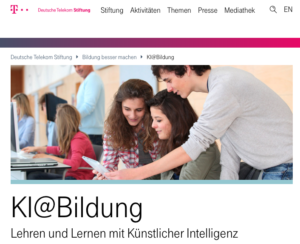 Many modern educational technologies already contain aspects of artificial intelligence (AI) – in applications for school organisation as well as for teaching and testing and for learning and practising. Examples are learning platforms or learning apps that adapt the task programme to the learner’s competence profile
Many modern educational technologies already contain aspects of artificial intelligence (AI) – in applications for school organisation as well as for teaching and testing and for learning and practising. Examples are learning platforms or learning apps that adapt the task programme to the learner’s competence profile
- But where do AI-supported, learning-promoting applications currently stand in their development? What already exists?
- What are the potentials, challenges and risks in this field?
- How far along are other countries in their development?
The Deutsche Telekom Foundation and its partners are investigating these questions. For example, the mmb Institute, in cooperation with the German Research Centre for Artificial Intelligence (DFKI) and the Leibniz Institute for Human Development and Educational Information (DIPF), has prepared a market and trend analysis.
For this purpose, the study’s authors created an initial overview of already available German- and English-language AI-supported offerings in an international comparison. With a view to potentials, challenges and risks, they also evaluated scientific studies and interviewed experts.
Based on the comprehensive findings, the study concludes with four recommendations:
- Didactic innovation process with space for experimentation.
- Establish “co-teaching” and “assisted learning” as guiding principles.
- Promote the further development of AI-based applications by providing secure data resources (“data lakes”).
- Expand the qualification of teaching staff and establish AI as an educational topic in the classroom.
In the course of 2021, the Telekom Foundation will devote itself to the topic of artificial intelligence in education with further projects. The full report can be downlaoded here: KI in der Bildung Report
++++ German ++++
KI@Bildung
Lehren und Lernen mit Künstlicher Intelligenz
In vielen modernen Bildungstechnologien stecken schon heute Aspekte Künstlicher Intelligenz (KI) – in Anwendungen für die Schulorganisation genauso wie für das Lehren und Prüfen und fürs Lernen und Üben. Beispiele sind Lernplattformen oder Lern-Apps, die das Aufgabenprogramm dem Kompetenzprofil des Lernenden anpassen.
Wo aber stehen KI-gestützte, lernförderliche Anwendungen aktuell in ihrer Entwicklung? Was gibt es bereits? Wo liegen die Potenziale, was sind Herausforderungen und Risiken auf diesem Gebiet? Wie weit sind andere Länder in der Entwicklung? Diesen Fragen geht die Deutsche Telekom Stiftung mit Partnern nach. So hat das mmb Institut unter Mitarbeit des Deutschen Forschungszentrums für Künstliche Intelligenz (DFKI) und des Leibniz-Instituts für Bildungsforschung und Bildungsinformation (DIPF) eine Markt- und Trendanalyse erstellt.
Dazu haben die Studienmacher einen ersten Überblick über bereits verfügbare, deutsch- und englischsprachige KI-unterstützte Angebote in einem internationalen Vergleich erstellt. Mit Blick auf Potenziale, Herausforderungen und Risiken haben sie zudem wissenschaftliche Studien ausgewertet sowie Expertinnen und Experten befragt.
- Auf den umfassenden Erkenntnissen aufbauend, schließt die Studie mit vier Empfehlungen.
- Didaktischer Innovationsprozess mit Raum zum Experimentieren.
- „Co-Teaching“ und „Assisted Learning“ als Leitbilder etablieren.
- Die weitere Entwicklung KI-basierter Anwendungen durch Bereitstellung sicherer Daten- ressourcen („Data-Lakes“) fördern.
- Qualifizierung des Lehrpersonals ausbauen und KI als Bildungsthema im Unterricht etablieren
Im Laufe des Jahres 2021 wird die Telekom-Stiftung sich dem Thema Künstliche Intelligenz in der Bildung mit weiteren Vorhaben widmen.Der Report steht hier zum download zur Verfügung: KI in der Bildung Report
